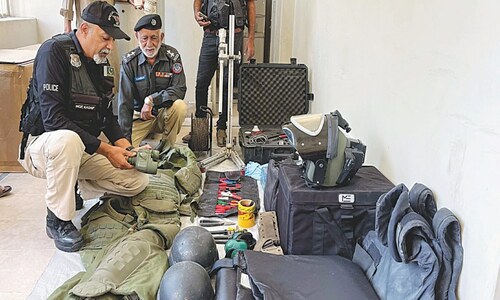KARACHI: Speakers drew attention to different aspects of the glorious past and chaotic present of the city of Karachi at a seminar held to celebrate the launch of a book Karachi: Sindh Ji Marui (The Marui of Sindh) by Gul Hassan Kalmati at Szabist on Friday evening.
Former Pakistani ambassador to the United Nations Hussain Haroon presided over the event. Addressing the audience, he said they were at the seminar to express their varied opinions on what had happened to Karachi in their effort to create hope and recall “all that has disappeared — physical, social, socio-economic factors — which has now led to us the brink of disaster”.
Lauding Mr Kalmati’s book, he said it’s a compendium “assimilating so much record in one place” and that there was still space for a few more volumes to “understand the complex situation”.
Mr Haroon painted a bleak picture while speaking on how the city had gone from bad to worse and perhaps would worsen in the time to come. He said the question as to why we were in this mess needed to be asked. He argued that in the past there were people who used to ‘plan’ not only the development of the city, but also how it should be protected. Over the years things began to deteriorate so much so that today the “productivity of the city has crumbled, and it’s killing its hinterlands”.
Efforts were being made to disenfranchise the Karachi port and everyone was buying land with impunity, destroying the ecosystem in the process, he lamented attributing it to ‘no planning’.
Writer Amar Jaleel said Mr Kalmati had written his (Mr Jaleel’s) biography because reading the book had made him feel as if he’s roaming around in the streets of old Karachi. Talking about the undesirable changes that had occurred over the decades, he said certain buildings, such as that of the Central Jail, were built three to four miles away from the city. These days Karachi’s main jail was smack in the middle of the city and there were eight pathways to reach it. Among many other things memory was to do with names, he pointed out, but sadly in Karachi names of roads and streets were changed to the detriment of history. In that context, he cited the examples of Elphinstone Street which is now called Zaibunnissa Street and Shivji Park which after partition was turned into Aurangzeb Park.
Mr Jaleel said the bid to break away from the Bombay Presidency (1936) so that Muslims didn’t become a minority had a cost. After 1936 not many quality buildings were constructed in the city, save for the NJV building, which he said served many purposes, including that of the Sindh Assembly building which meant that the capital of Sindh was never shifted from Karachi. As for the name of the book, he said since it had used the character of Marui as a symbol, today there was not one entity which intended to abduct Karachi because of which it could be spared of the agni pariksha (test of fire) as it happened in the Umar-Marui story. Instead, the city was now drenched in blood.
Architect Arif Hasan praised Mr Kalmati’s attempt because in its 30 odd chapters it had touched upon every subject related to the city. “History tells us that cities change,” he said. To explain the process he narrated his experience of visiting the city of his parents’ birth Panipat in India. There he met a halwai, who upon knowing that his parents had migrated from the city, told him that once they left, the Punjabis came to Panipat and destroyed it; now it’s no more the city of his parents. Later when he met another person, who had migrated to that city from Khanewal (Pakistan), he reasoned that those who lived there before partition were a lazy lot.
Pointing out the problems faced by Karachi, Mr Hasan said in 1948 the capital of Sindh was shifted to Hyderabad from Karachi. If it had remained the capital, things would have been better. “Power was shifted out; power structure matters,” he commented. Another reason for Karachi’s ills, he said, was the non-implementation of plans. The first plan was made in 1951 and a spanner was thrown in the works. Then Ayub Khan took some decisions which created ethnic based localities for the first time in the city, ending the multi-class system. The third phase of plans was during Yahya Khan’s rule which, after the 1977 change in government, fell prey to corruption allegations. He emphasised that the things discussed in Mr Kalmati’s book should be connected to present-day realities, and we should convince our politicians that the issue of land buying and land grabbing (zameenon ki lootmaar) must end.
Gul Hassan Kalmati talked about the problems he confronted while researching for the book and told the attendees that other books were in the pipeline as well. He said work on Urdu translation of the book had already begun.
Dr Ghazala Rehman, Mehtab Akbar Rashdi, Prof Dr Fateh Mohammad Burfat, Luqman Palari and Karamat Ali also spoke. Four students presented Shah Jo Kalaam.
The event was organised by the Sindh Abhyas Academy and Naoon Niyapo Academy.
Published in Dawn, January 31st, 2015
On a mobile phone? Get the Dawn Mobile App: Apple Store | Google Play














































